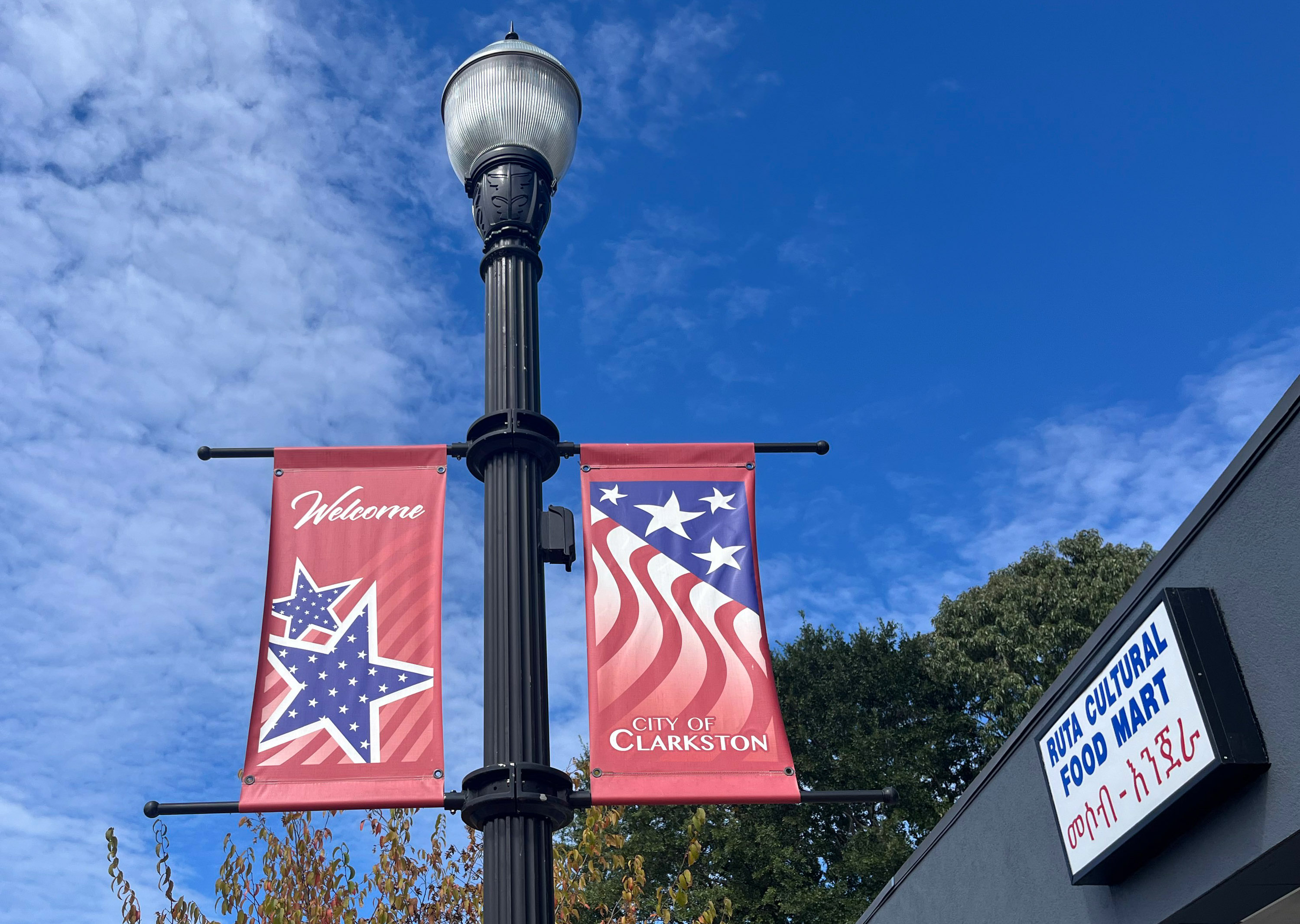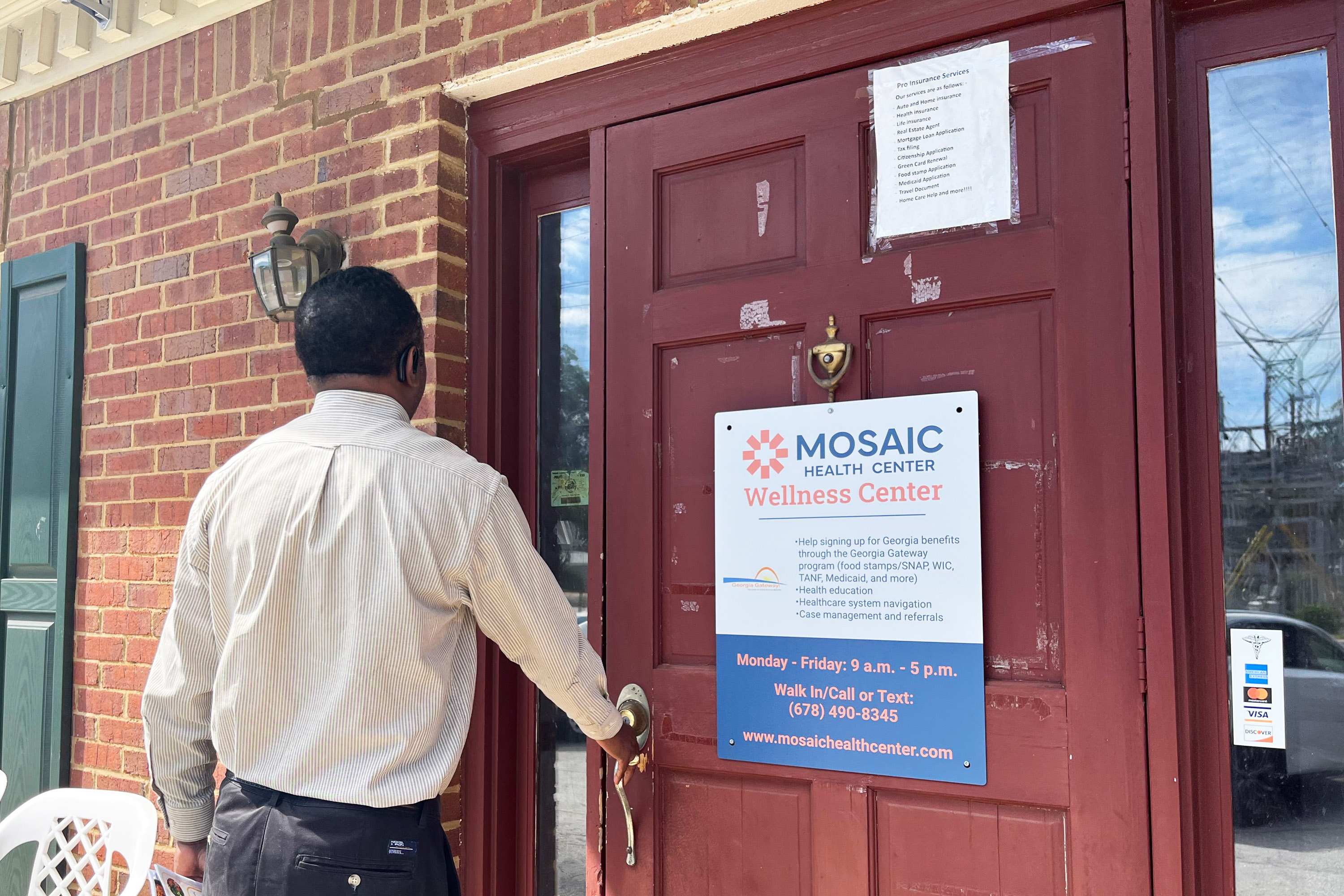CLARKSTON, Ga. — After fleeing the war-torn Democratic Republic of Congo, Antoinette landed within the Atlanta space final November and started to seek out her footing with federal assist.
Separated from her grownup kids and grieving her husband’s demise within the struggle, she began a job packing containers in a warehouse, making simply sufficient to cowl hire for her personal condominium and payments.
Antoinette has been counting on the Supplemental Vitamin Help Program, previously referred to as meals stamps, for her weekly grocery journeys.
However now, simply as life is beginning to stabilize, she should cope with a brand new setback.
President Donald Trump’s large finances regulation, which Republicans name the One Huge Lovely Invoice Act, slashes $187 billion — or almost 20% — from the federal finances for SNAP via 2034. And separate from any momentary SNAP stoppages as a result of federal shutdown, the regulation cuts off entry fully for refugees and different immigrant teams within the nation lawfully. The change was slated to take impact instantly when the regulation was signed in July, however states are nonetheless awaiting federal steerage on when to cease or part it out.
For Antoinette, 51, who didn’t need her final identify used for concern of deportation and sure persecution in her native nation, the lack of meals assist is dire.
“I would not have the means to buy food,” she mentioned in French via a translator. “How am I going to manage?”
All through its historical past, the U.S. has admitted into the nation refugees like Antoinette, individuals who have been persecuted, or concern persecution, of their homelands on account of race, faith, nationality, political views, or membership in a selected social group. These authorized immigrants sometimes face an in-depth vetting course of that may begin years earlier than they set foot on U.S. soil.
As soon as they arrive — typically with little or no means — the federal authorities gives assets similar to monetary help, Medicaid, and SNAP, outreach that has sometimes garnered bipartisan help. Now the Trump administration has pulled again the nation’s decades-long help for refugee communities.
The finances regulation, which funds a number of of the president’s priorities, together with tax cuts to rich Individuals and border safety, revokes refugees’ entry to Medicaid, the state-federal medical insurance program for folks with low incomes or disabilities, beginning in October 2026.
However one of many first provisions to take impact underneath the regulation removes SNAP eligibility for many refugees, asylum seekers, trafficking and home violence victims, and different authorized immigrants. About 90,000 folks will lose SNAP in a mean month because of the brand new restrictions narrowing which noncitizens can entry this system, in response to the Congressional Funds Workplace.
“It doesn’t get much more basic than food,” mentioned Matthew Soerens, vp of advocacy and coverage at World Aid, a Christian humanitarian group that helps U.S. refugees.
“Our government invited these people to rebuild their lives in this country with minimum support,” Soerens mentioned. “Taking food away from them is wrong.”
Not Only a Handout
The White Home and officers at the USA Division of Agriculture didn’t reply to emails about help for the supply that ends SNAP for refugees within the One Huge Lovely Invoice Act.
However Steven Camarota, director of analysis for the Heart for Immigration Research, which advocates for diminished ranges of immigration to the U.S., mentioned cuts to SNAP eligibility are affordable as a result of foreign-born folks and their younger kids disproportionately use public advantages.
Nonetheless, Camarota mentioned, the refugee inhabitants is completely different from different immigrant teams. “I don’t know that this would be the population I would start with,” Camarota mentioned. “It’s a relatively small population of people that we generally accept have a lot of need.”
Federal, state, and native spending on refugees and asylum seekers, together with meals, well being care, training, and different bills, totaled $457.2 billion from 2005 to 2019, in response to a February 2024 report from the Division of Well being and Human Providers. Throughout that point, 21% of refugees and asylum seekers obtained SNAP advantages, in contrast with 15% of all U.S. residents.
Along with the finances regulation’s SNAP adjustments, monetary help given to folks getting into the U.S. by the Workplace of Refugee Resettlement, part of HHS, has been minimize from one yr to 4 months.
The HHS report additionally discovered that regardless of the preliminary prices of caring for refugees and asylees, this neighborhood contributed $123.8 billion extra to federal, state, and native governments via taxes than they obtained in public advantages over the 15 years.
It’s within the nation’s greatest curiosity to proceed to help them, mentioned Krish O’Mara Vignarajah, president and CEO of World Refuge, a nonprofit refugee resettlement company.
“This is not what we should think about as a handout,” she mentioned. “We know that when we support them initially, they go on to not just survive but thrive.”
Meals Is Medication
Meals insecurity can have lifelong bodily and psychological well being penalties for individuals who have already confronted years of instability earlier than coming to the U.S., mentioned Andrew Kim, co-founder of Ethnē Well being, a neighborhood well being clinic in Clarkston, an Atlanta suburb that’s house to 1000’s of refugees.

Noncitizens affected by the brand new regulation would have obtained, on common, $210 a month throughout the subsequent decade, in response to the CBO. With out SNAP funds, many refugees and their households would possibly skip meals and change to lower-quality, cheap choices, resulting in persistent well being issues similar to weight problems and insulin resistance, and doubtlessly worsening already critical psychological well being situations, he mentioned.
After her husband was killed within the Democratic Republic of Congo, Antoinette mentioned, she turned separated from all seven of her kids. The youngest is nineteen. She nonetheless isn’t positive the place they’re. She misses them however is set to construct a brand new life for herself. For her, assets like SNAP are essential.
From the convention room of New American Pathways, the nonprofit that helped her enroll in advantages, Antoinette stared straight forward, stone-faced, when requested about how the cuts would have an effect on her.
Will she store much less? Will she eat fewer vegetables and fruit, and fewer meat? Will she skip meals?
“Oui,” she replied to every query, utilizing the French for “yes.”
Since arriving within the U.S. final yr from Ethiopia together with his spouse and two teen daughters, Lukas, 61, has been addressing diabetes-related issues, similar to blurry imaginative and prescient, complications, and hassle sleeping. SNAP advantages enable him and his household to afford recent greens like spinach and broccoli, in response to Lilly Tenaw, the nurse practitioner who treats Lukas and helped translate his interview.
His blood sugar is now at a safer degree, he mentioned proudly after a category at Mosaic Well being Heart, a neighborhood clinic in Clarkston, the place he discovered to make lentil soup and steadiness his weight-reduction plan.
“The assistance gives us hope and encourages us to see life in a positive way,” he mentioned in Amharic via a translator. Lukas wished to make use of solely his household identify as a result of he had been jailed and confronted persecution in Ethiopia, and now worries about jeopardizing his means to get everlasting residency within the U.S.

Starvation and poor diet can decrease productiveness and make it arduous for folks to seek out and preserve jobs, mentioned Valerie Lacarte, a senior coverage analyst on the Migration Coverage Institute.
“It could affect the labor market,” she mentioned. “It’s bleak.”
Extra SNAP Cuts To Come
Whereas the Trump administration ended SNAP for refugees efficient instantly, the change has created uncertainty for individuals who present help.
State officers in Texas and California, which obtain essentially the most refugees amongst states, and in Georgia informed KFF Well being Information that the USDA, which runs this system, has but to subject steerage on whether or not they need to cease offering SNAP on a particular date or part it out.
And it’s not simply refugees who’re affected.
Practically 42 million folks obtain SNAP advantages, in response to the USDA. The nonpartisan Congressional Funds Workplace estimates that, throughout the subsequent decade, greater than 3 million folks will lose month-to-month meals {dollars} due to deliberate adjustments — similar to an extension of labor necessities to extra folks and a shift in prices from the federal authorities to the states.
In September, the administration ended a key report that repeatedly measured meals insecurity amongst all U.S. households, making it more durable to evaluate the toll of the SNAP cuts.
The USDA additionally posted on its web site that no advantages could be issued for anybody beginning Nov. 1 due to the federal shutdown, blaming Senate Democrats. The Trump administration has refused to launch emergency funding — as previous administrations have carried out throughout shutdowns — in order that states can proceed issuing advantages whereas congressional leaders work out a finances deal. A coalition of attorneys common and governors from 25 states and the District of Columbia filed a lawsuit on Oct. 28 contesting the administration’s resolution.
Cuts to SNAP will ripple via native grocery shops and farms, stretching the assets of charity organizations and native governments, mentioned Ted Terry, a DeKalb County commissioner and former mayor of Clarkston.
“It’s just the whole ecosystem that has been in place for 40 years completely being disrupted,” he mentioned.
Muzhda Oriakhil, senior neighborhood engagement supervisor at Associates of Refugees, an Atlanta-area nonprofit that helps refugees resettle, mentioned her group and others are scrambling to supply momentary meals help for refugee households. However charity organizations, meals banks, and different nonprofit teams can’t make up for the lack of billions of federal {dollars} that assist households pay for meals.
“A lot of families, they may starve,” she mentioned.




